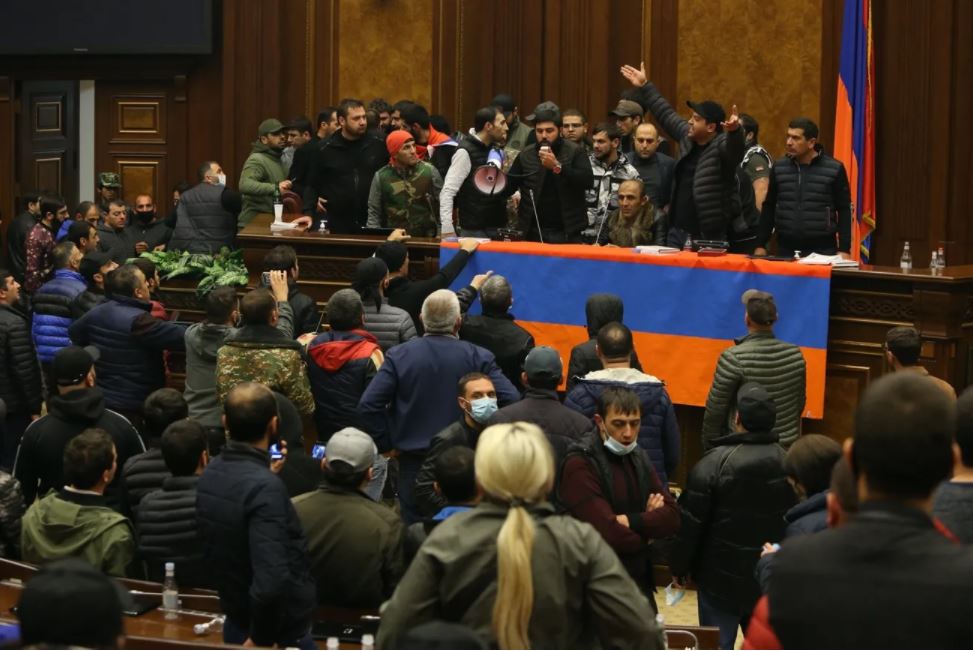RA’s Daily Russia News Blast – November 10, 2020

Today in Russia: Karabakh fighting may be coming to an end with new agreement, Russian peacekeepers en-route to the region; Baku’s mea culpa; No congrats (yet) for Biden; Russian election watching; Nearly 21,000 more cases of COVID-19; “Rapid ministers” as new Duma processes enacted in line with constitutional amendments
Armenia signed a cessation of hostilities agreement with Azerbaijan effective from 1 pm on November 10, Armenian Prime Minister Nikol Pashinyan wrote on his Facebook page. Pashinyan said the terms are “unbelievably painful for me and our people,” but was made on consideration of the military situation on the ground. Azerbaijan has steadily been making military gains, dealing loss after loss of territory from Armenian control, including the November 8 capture of Shusha, their historical capital in Karabakh.
The Russian brokered agreement “calls for Russian peacekeepers to patrol the Lachin Corridor connecting Nagorno-Karabakh with Armenia proper and for Armenia to withdraw from other contested territories outside Nagorno-Karabakh.” Armenia will cede control over the Kelbajar region by November 15 and the Afghdam region by November 20. The status of Nagorno-Karabakh proper, including the capital Stepanakert, was not addressed. The agreement also includes a type of corridor from Nakhchivan, an Azerbaijani enclave currency cut off from Azerbaijan proper, but the details of this were left unspecified. Turkish Foreign Minister Mevlüt Çavuşoğlu congratulated Baku [in Russian] on the agreement, calling it “Armenia’s surrender,” as did Azerbaijan’s President [in Russian] Ilham Aliyev.
While Baku has broken out in celebration, Yerevan saw protesters [in Russian] break into the main government building. Meduza wrote, “Civil unrest erupted in Yerevan after Prime Minister Pashinyan announced the “extremely painful decision” to accept the settlement’s terms. Hundreds of protesters flooded the capital’s streets, stormed the House of Government, and vandalized the building’s insides. Angry demonstrators shouted condemnations of the prime minister and marched toward his official residence, seeking an audience. An angry mob also attacked Ararat Mirzoyan, the speaker of Armenia’s Parliament, and beat him unconscious.“
Kommersant reported that ten planes filled with Russian peacekeepers – who are to be posted along the line of control – are currently en-route to the region [in Russian]. Yerevan has denied reports [in Russian] that Turkey will play a role in peacekeeping.
Azerbaijan apologized to Russia for shooting down a Russian Mi-24 helicopter close to the Azeribaijani border last night. Two died and three were injured in the incident, and it came as Russia was brokering a peace deal between the two sides.
President Vladimir Putin will not extend his congratulations to US President-Elect Joe Biden (yet). Kremlin Spokesman Dmitry Peskov said [in Russian], “We believe it’s correct to wait for the official results of the elections to be announced.“
The New York Times wrote that “In Russia, the drawn-out aftermath of America’s Election Day has become the focus of a domestic political struggle in its own right, feeding a debate over whether Russia’s tightly scripted political landscape has unique advantages over American democracy.” They write that supporters of Vladimir Putin see Trump’s baseless allegations of fraud in the polls to be a perfect reminder of the danger of liberal democracy, while opponents take the opposition view: “The sheer unpredictability and tinge of chaos surrounding the world’s most consequential election underscore the greatness of a free system.” Political scientist Alexander Kynev told the Times, “All this stuff, the criticism by Trump, de facto functions to justify Russian authoritarianism…It all finds very fertile ground in Russia because we have mass distrust in our own elections.”
Russia reported nearly 21,000 [in Russian] new COVID-19 cases, bringing the total number of reported infections since the start of the pandemic to 1.8 million.
Kommersant wrote of new procedures for the approval of members of the cabinet following changes to the process in the June 2020 constitutional referendum: “On November 9, the State Duma began for the first time to approve members of the government according to a new procedure provided for by amendments to the Constitution approved in the summer. The deputies had to come up with the procedure for considering candidates for the deputy prime minister and five ministers on the go, since the Duma did not manage to make the necessary changes to its regulations after the adoption of the new law on the government. On Monday, candidates answered questions from relevant committees and factions, and on Tuesday the question of their confirmation in office will be brought up to a plenary session. No sensations are expected: only the Communists announced their intention to abstain from voting.”
PHOTO: Angry crowds of protesters stormed the parliament building in Yerevan, Armenia, after Prime Minister Nikol Pashinyan announced the signing of a Russian-brokered agreement with Azerbaijan. The agreement is widely viewed in both countries as a capitulation by Yerevan in the face of mounting military setbacks and losses of territory (Vahram Baghdasaryan / EPA / Scanpix / LETA).











